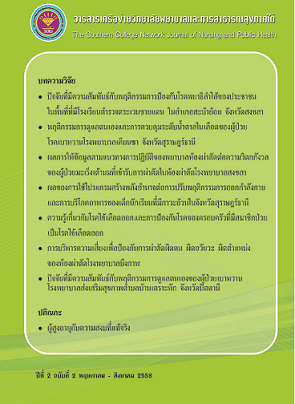ผลของการใช้โปรแกรมสร้างพลังอำนาจต่อการปรับพฤติกรรมการออกกำลังกาย และการบริโภคอาหารของเด็กนักเรียนที่มีภาวะอ้วนในจังหวัดสุราษฎร์ธานี
คำสำคัญ:
การปรับพฤติกรรม, โปรแกรมสร้างพลังอำนาจ, ภาวะอ้วน, การออกกำลังกาย, การบริโภคอาหาร, Behaviors Modification, Empowerment Program, Obese student, Exercise, Food Consumptionบทคัดย่อ
การวิจัยครั้งนี้เป็นการวิจัยกึ่งทดลอง มีวัตถุประสงค์เพื่อศึกษาการปรับพฤติกรรมการออกกำลังกายและการบริโภคอาหารโดยใช้โปรแกรมการสร้างพลังอำนาจของเด็กนักเรียนที่มีภาวะอ้วน ตามทฤษฎีการสร้างพลังอำนาจของ Gibson (1995) กลุ่มตัวอย่างเป็นเด็กนักเรียน อายุ 10 – 12 ปีในเขตเทศบาลนครสุราษฎร์ธานีที่มีภาวะอ้วน โดยประเมินภาวะอ้วนจากการชั่งน้ำหนักและวัดส่วนสูง โดยใช้เกณฑ์น้ำหนักเทียบกับส่วนสูง จำนวน 60 คน ให้เด็กนักเรียนตอบแบบสอบถามพฤติกรรมการออกกำลังกายและการบริโภคอาหาร เพื่อใช้ข้อมูลในการกำหนดกลุ่มที่มีลักษณะใกล้เคียงกันมากที่สุด และต้องได้รับอนุญาตจากผู้ปกครอง จัดเข้ากลุ่มทดลองและกลุ่มควบคุม โดยการจับคู่ (Matched pairs) กลุ่มละ 30คน กลุ่มทดลองได้รับการสร้างพลังอำนาจตามขั้นตอนการสร้างพลังอำนาจที่ผู้วิจัยสร้างขึ้น ส่วนกลุ่มควบคุมได้รับการดูแลตามปกติ เก็บรวบรวมข้อมูลโดยใช้แบบสอบถามพฤติกรรมการออกกำลังกาย และแบบสอบถามพฤติกรรมการบริโภคอาหารที่ผ่านการทดสอบความตรงของเนื้อหาด้วยความสอดคล้อง(IOC) เท่ากับ .86และความเชื่อมั่นโดยใช้สูตรการหาสัมประสิทธิ์แอลฟาของ Cronbach มีค่าเท่ากับ .80และ .75 ตามลำดับ วิเคราะห์ข้อมูลโดยหาค่าเฉลี่ย ส่วนเบี่ยงเบนมาตรฐาน และทดสอบค่าที (t – test)
ผลการวิจัยสรุปได้ ดังนี้ 1) คะแนนเฉลี่ยการออกกำลังกาย (M=17.53, SD=4.03) เพิ่มมากขึ้นกว่าก่อนได้รับโปรแกรมสร้างพลังอำนาจ (M=14.83, SD=3.72) อย่างมีนัยสำคัญทางสถิติ (t(df) =-3.34(29), p=.002) สำหรับคะแนนเฉลี่ยพฤติกรรมการบริโภคอาหาร พบว่าหลังได้รับโปรแกรมสร้างพลังอำนาจเด็กนักเรียนที่มีภาวะอ้วนมีคะแนนเฉลี่ยพฤติกรรมการบริโภคอาหาร (M=38.77, SD=5.44) เพิ่มขึ้นกว่าก่อนได้รับโปรแกรมการเสริมพลังอำนาจ (M=32.37, SD=7.22) อย่างมีนัยสำคัญทางสถิติ(t(df) =-4.89, p=.000) 2) คะแนนเฉลี่ยพฤติกรรมการออกกำลังกายและพฤติกรรมการบริโภคระหว่างกลุ่มควบคุมและกลุ่มทดลองก่อนได้รับโปรแกรมไม่แตกต่างกัน สำหรับหลังได้รับโปรแกรมการสร้างพลังอำนาจแตกต่างกันอย่างมีนัยสำคัญทางสถิติ (t(df) =-3.25 (58), p=.002); (t(df) =-4.04 (58), p=.000)
Effects of the Empowerment Program on Behavior Modification Regarding Exercise and Food Consumption among Obese Students in Suratthani Province
This quasi-experimental research aimed to study the effects of empowerment program on behavior modification regarding exercise and food consumption among obese students in Suratthani municipality, Suratthani province. The empowerment theory of Gibson (1995) was employed as a conceptual framework in this study. Sample was 60 obese students, aged from 10 to 12 years old.Weighing and height measuring among students were assessed in order to determine their obesity. All those 60 students responded to self-reported questionnaire regarding their exercise and food consumption behavior prior to the experiment. The assent form was presented to get parents’ permission. The samples were equally assigned to an experimental group and a control group by matching age, sex, class, weight, and height; it is to say 30 obese students in each group. The experimental group received the empowerment program while the control group received routine caring. The data were collected by using questionnaire regarding the exercise and the food consumption behavior. Content validity of the questionnaire was confirmed by experts. The IOC was equal to .86. The Cronbach’s alpha coefficient was used to examine reliability of the questionnaire, yielding a value of .80 and .75, respectively.The reliability of these questionnaires was .80. The data were analyzed by the following statistics: mean, standard deviation, and t-test.
The major findings were as follows.
1. The mean score of the exercise behavior of the experimental group after receiving the empowerment program (M=17.53, SD=4.03) was significantly higher than prior to receiving the program (M=14.83, SD=3.27) (t(df) = -3.34 (29), p=.002). The mean score of the food consumption behavior of the experimental group after receving the empowerment program (M=38.77, SD=5.44) was significantly higher than prior to receivingthe program (M=32.37, SD=7.22) (t(df) = -4.89, p = .000).
2. The mean score of the exercise and food consumption behavior between experimental group and control group prior to receiving the empowerment program was no significantly difference. However, the mean score of the exercise and food consumption behavior after receiving program in experinental group was sifnificantly higher than control group (t(df) = 3.25 (58), p = .002; t (df) = 4.04 (58) , p = .000).
ดาวน์โหลด
เผยแพร่แล้ว
ฉบับ
ประเภทบทความ
สัญญาอนุญาต
1. บทความหรือข้อคิดเห็นใด ๆ ที่ปรากฏในวารสารเครือข่าย วิทยาลัยพยาบาลและการสาธารณสุขภาคใต้ ที่เป็นวรรณกรรมของผู้เขียน บรรณาธิการหรือเครือข่ายวิทยาลัยพยาบาลและวิทยาลัยการสาธารณสุขภาคใต้ ไม่จำเป็นต้องเห็นด้วย
2. บทความที่ได้รับการตีพิมพ์ถือเป็นลิขสิทธิ์ของ วารสารเครือข่ายวิทยาลัยพยาบาลและการสาธารณสุขภาคใต้








